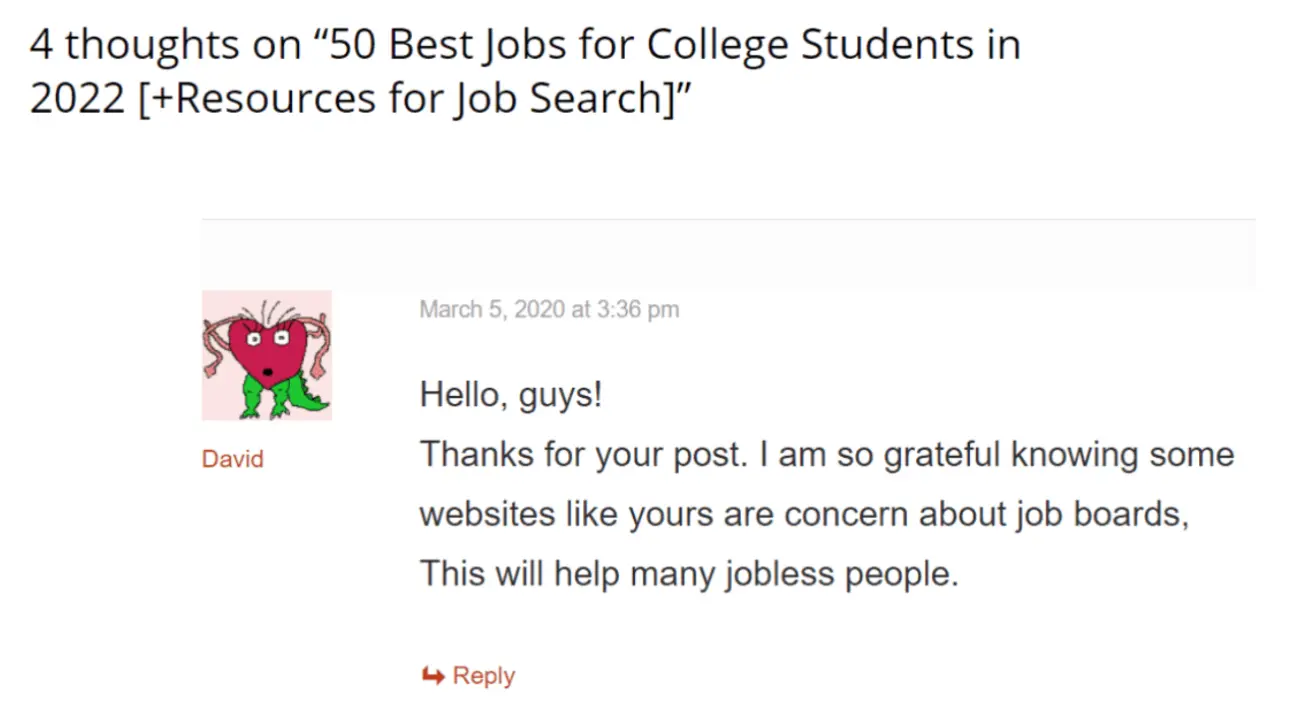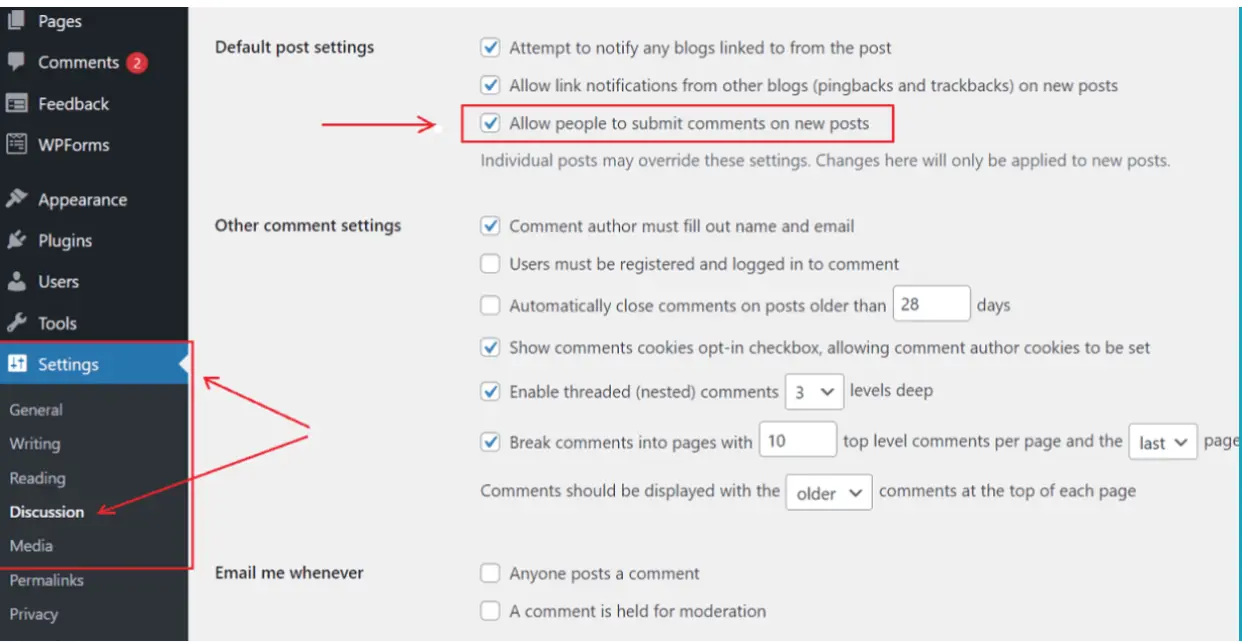As a blogger or a business owner with a WordPress website, you know the power of comments, don't you?
*Updated 8/20/2024
Comments compliment the content, grow page views, engage users in discussions, bring SEO benefits, and help convert readers into followers or customers.
One tiny problem:
If you don't customize the Comments Settings in your admin panel and don't spend time moderating and replying to messages from readers, your website's performance will plunge into the SERP abyss.
Comments' quality and your reaction to them do matter for website conversion. In this article, you'll learn how to moderate and write comments in WordPress for better SEO and marketing results.
What Are Comments in WordPress?
Comments in WordPress are messages users leave at the foot of your blog content. Like this:

The platform introduced this feature back in 2004, therefore turning static websites into dynamic ones and allowing users to interact with content creators and each other. It was a kind of revolution as it made the internet interactive.
When you install WordPress, you get the commenting feature by default. For those willing to turn it off, it's enough to go to Settings -> Discussion and uncheck the "Allow people to submit comments on new posts" box:

And yet, we wouldn't recommend doing so. Focus on your WordPress comments' proper customization and moderation instead. Keep on reading to find out why.
Why Bother About WordPress Blog Comments
Some webmasters are afraid of blog comments because they attract spammers, thus hurting SEO and the overall website health. The volume of spam comments may reach the level where a blog administrator decides it's just not worth it.
Plus, comment moderation is time-consuming:
It takes time to read, analyze, and provide detailed responses to all commentators.
However, this game is worth it because, working with comments, you add to the SEO value of your content, build trust, and convert your website visitors into loyal followers or customers.
Below are the particular pros and SEO benefits you can get when moderating comments in WordPress.
-
Pros of comments in WordPress
- They boost engagement. By allowing readers to comment on your content, you build relationships and learn your target audience's needs.
- Comments are a part of your article. If a reader doesn't find some information or doesn't understand something in your post, they go to the comments to ask questions. It's your chance to provide them with answers, thus making your content piece more informative and valuable.

More than that, if a reader has questions related to your previously published content, you can use comments to forward them to your other WordPress pages, thus influencing their performance.

-
- WordPress comments grow page views. The more comments, the more exposure: It's a signal for both users and search engines that a content piece evokes discussion, so it means it's interesting to check.
- WordPress comments may work as a conversion tool. If your arguments in content weren't enough to persuade a reader, you can provide further explanation in the comments to withdraw all objections.
- Comments give you new content ideas. Readers often ask about what they'd like to see on your blog; if you haven't covered those topics before, why not take those ideas for new blog posts?

P.S. The website has done it, by the way, and that post about essay conclusions remained the #1 source of organic traffic for years already.

-
WordPress blog comments and SEO
Long story short, blog comments in WordPress are good for SEO. Here is why:
First, Google considers comments as part of an article. It means the word count increases, and algorithms see the page as a more comprehensive one to satisfy user search intent.
Second, readers often use words in comments that are semantically related to your target keyword, thus adding to the SEO value of your content.
Finally, users spend more time on your page when reading comments, thus influencing a signal such as a user engagement with content. As we know, this is a ranking factor, so it can give your content an SEO boost.
So, here's the point:
To get the most SEO benefits from your WordPress comments, don't be afraid of spammers but customize your settings and invest time moderating all reader reactions accordingly.
Customizing Comments Settings in WordPress
When you make a WordPress website, go to Settings -> Discussion in your WordPress admin panel and check or uncheck all the options related to comments. You can do the following:
- Disable comments for specific content pieces
- Decide on the required identification for a user to comment
- Turn on or off email notifications on new comments or those awaiting moderation
- Allow or disallow nested comments
- Set time on how long a content piece remains open for comments
- Decide on the stop words that will automatically send a comment to Trash
Another option to allow or disallow comments for specific posts is to go to All Posts and click on Quick Edit. Uncheck the corresponding buttons if you don't want to receive comments on your chosen blog post:

How to Moderate Comments in WordPress
And now, for practical writing tips on how to moderate WordPress comments. While many have been covered in this post already, below are a few more for you to consider:
1) Don't hurry up to delete negative comments
Negative comments aren't necessarily about spam or trash. They also don't mean your content asset is poorly-written or low-performing. If you see that an article gets dozens of negative comments but still brings new leads, how can it be ineffective?
According to statistics, only one in ten consumers visit a website page to leave positive feedback; negative thoughts are 2-3 times more likely to get shared.
What to do with negative comments and how to moderate them?
If they aren't spammy with tons of irrelevant backlinks or incoherent word salad, the best practice would be to approve and leave them for increasing your article's virality. After all, the more reactions it gets, the more users will see it.
If they are reasonable comments pointing at your mistake or wrong actions, write a reply that will help turn the negativity into a positive experience. Check facts, apologize, and revise your content, but remember to thank a reader and say that you appreciate their help.
2) Be polite and answer questions
While it might be hard to stay calm and resist the temptation to tell negative commentators where to get off, it's not an option. Even if you are right, users will hardly accept your offensive tone of voice.
Always be polite in the comments: Call a commentator by name, keep your reply respectful, and never belittle users for lack of knowledge.
Be encouraging: A commenter may sincerely want to understand and clarify the information.
Never ignore comments with questions: Start your response with "Thanks for your question" or say hi at least; do your best to provide a solution or share resources where a reader can find an answer.
Sincere help and a positive tone of voice are your weapon to build loyalty and turn your WordPress comments into a lead generation tool.
3) Encourage discussion and write as if you reply to everyone
To influence the virality of your content assets, you can use some writing tricks to motivate readers to comment:
The first and foremost tool is your CTA (call to action) at the end of a blog post.
Invite users to share their insights on the topic, ask their questions in comments, share their examples, etc. This trick is trendy among content writers because it works.
You can also start a discussion, writing the first comment at the foot of your blog content: Ask a question to readers so they would join and share their thoughts on it.
An efficient tactic is to communicate with commentators: Ask for more details, thank them for their points of view, share your stories, write follow-up questions to encourage further discussion, etc. Not only will you motivate readers to continue writing, but you'll also make your comments section more informative.
If you don't have time to reply to all comments in WordPress or can’t assign this work to your dedicated development team, please focus on the most interesting and valuable ones. Provide educational and informative responses so that other readers would benefit from your messages too.
Remember that all visitors will see your reply, not the only one who asked a question:
When writing, ensure that other people who check the comments will also understand you. Before hitting "Publish," ask yourself, "How will this comment describe my brand in the eyes of strangers?"
Use positive language and write like a human: Say no to jargon, professional slang, and too complicated terms average users may misunderstand. Your goal is to make comments straight and clear.
Long Story Short
Comments in WordPress have tons of benefits for your website: It's your chance to connect with readers, build trust, convert them into customers, and grow the SEO performance of your resource.
To make comments work, you need to invest time in moderating and replying to them; otherwise, they will turn into a spammers' party and destroy all your SEO endeavors.
Make the most out of negative comments, ignore haters but learn from fair criticism, reply to as many messages as you can, be polite, answer questions, help your readers, encourage discussions, and remember:
Your comments in WordPress are for communicating with ALL the audience. Make them informative, straight, and fair.
And now, over to you:
How do you work with the comments in your WordPress for customer engagement and conversion? Have you already tried any form builder or other plugins to motivate customer feedback? Any specific strategy you could share with the world? Please don't hesitate to tell us in the comments below!
Author Bio
Lesley is a content writer, blogger, and contributor to online publications on education, career, and digital marketing. Current blogger at eLeaning Industry, EasyEssay, AcademicHelp, and a few other edu websites. Nature lover, bookworm, and coffee addict.




